Yesterday, Ofqual announced that it would be adjusting the grading standards in GCSE French and German next summer.
This is long overdue as we argued in this blogpost.
But although the proposed adjustment is welcome, does it go far enough?
MFL grading in 2018 compared to English and maths
Ofqual has decided to bring awards at grade 4 and above in French and German in line with Spanish. Whereas French and German have historically been graded more severely at almost all grades, Ofqual argues that this is not the case in Spanish. Furthermore, Ofqual took into account criteria other than grading severity in reaching their decision, for example GCSE and A-Level entry numbers have been increasing in Spanish.
Ofqual’s analysis of GCSE subject difficulty covers the period 2006 to 2016. I’m going to look at 2018 data for state-funded mainstream schools and compare grades awarded in modern foreign languages with the grades that pupils achieved in English language and maths. This is a simple way of looking at subject difficulty, but English and maths are the two subjects that almost everyone takes and so form a good enough basis for comparison.
The charts below show grades awarded in each of French, German and Spanish compared to entrants’ grades in English and maths.
Several things leap out.
Firstly, that Spanish awards at grade 9 are in line with English and maths.
Secondly, that the most common, or modal, grade in Spanish is 3.
Thirdly, that far more entries are graded below 4 in all three MFL subjects, including Spanish, than in English and maths.
Spanish grading in 2018 compared to geography and history
But perhaps English and maths don’t form an appropriate comparison group given that they take up more curriculum time. What if we looked, as Ofqual does, at geography and history instead, neither of which is graded particularly leniently?
Fewer pupils (68,000) took Spanish and one of these subjects than took Spanish and English or maths (80,000).
But nonetheless, the pattern is familiar. Spanish entries are more likely to be graded 5-2 and less likely to be graded 9-6.
So although the decision by Ofqual to adjust grading standards in French and German is welcome, it perhaps does not go far enough. Bringing them in line with Spanish will still leave MFL more severely graded than other subjects, particularly if Ofqual is only going to consider grades 4 and above. Pupils are more likely to achieve grade 3 or lower in MFL than in English and maths and that applies to Spanish as much as French and German.
Want to stay up-to-date with the latest research from FFT Education Datalab? Sign up to Datalab’s mailing list to get notifications about new blogposts, or to receive the team’s half-termly newsletter.





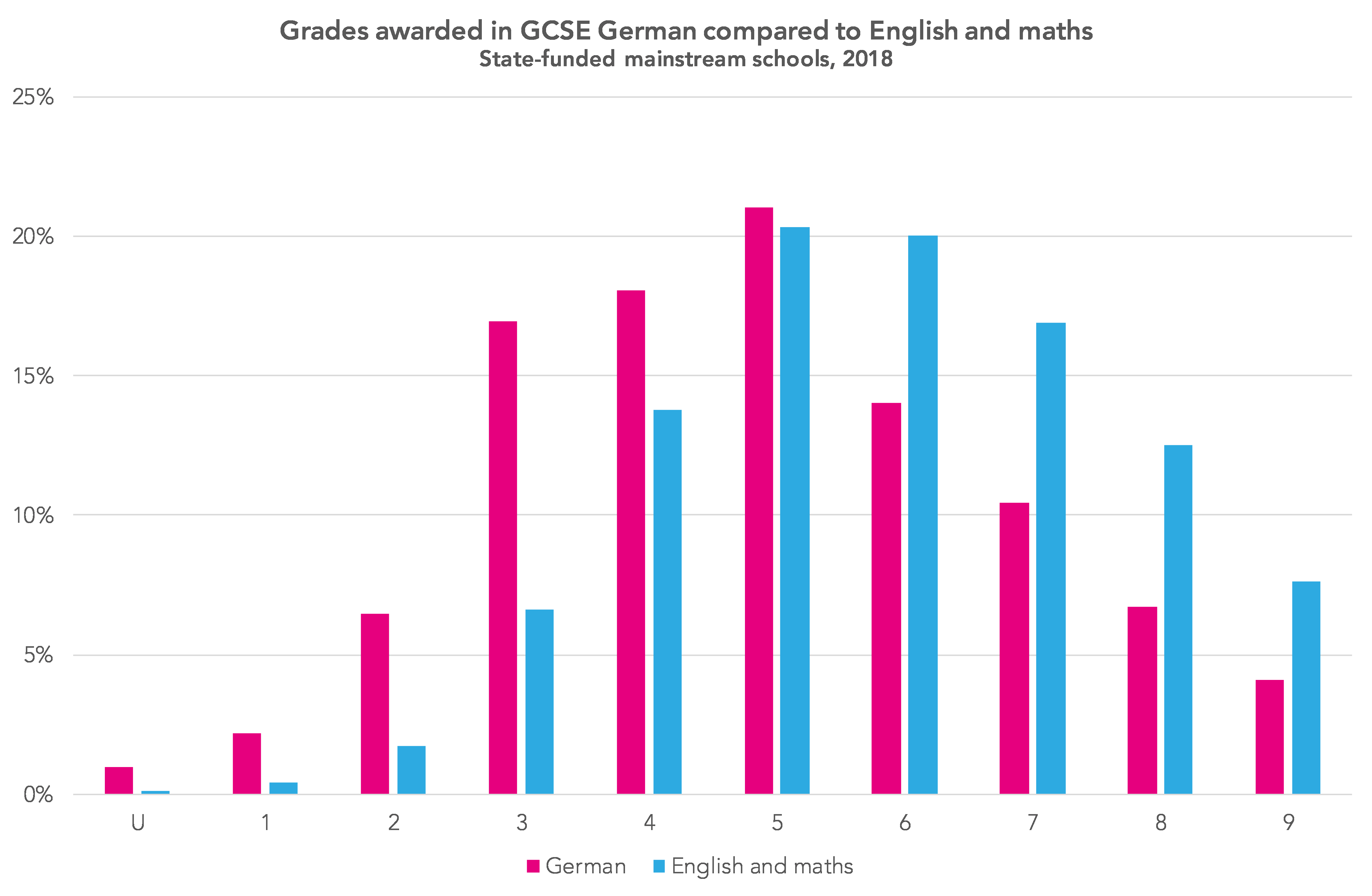


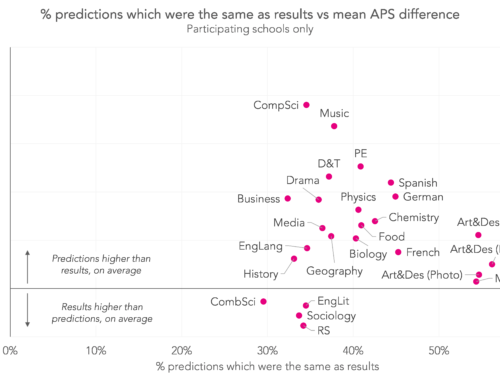

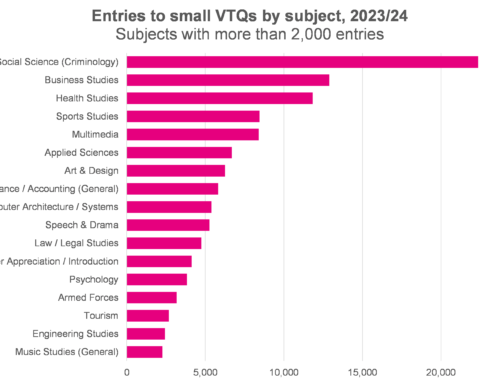
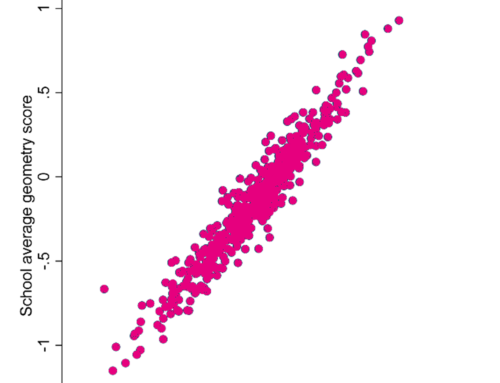
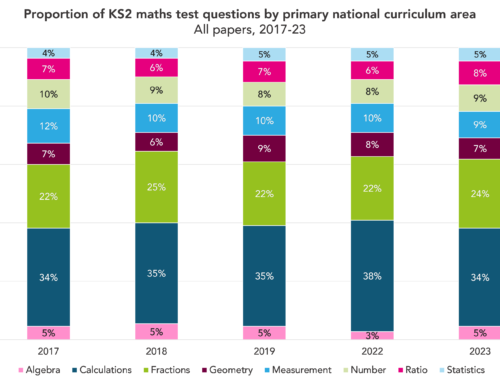
This article appears to be equating pupil attainment and exam difficult, and saying that they should be comparable.
However, there are a number of reasons why, for example, pupils may get higher results in English and Maths than in, say, French.
For example:
1. There is a measure of “% of pupils attaining English and Maths at Grade 4+”. There is no such measure for French.
2. Pupils have to retake English if they don’t get Grade 4, and so may put in additional effort. There is no such requirement for French.
3. There may be more teaching time available for English, including in Key Stage 3, compared to French.
There are probably many more reasons than these few. It is probably for this reason that attainment was just 1 of the 4 factors looked at by the DfE.
Hi Phillip. Thanks for responding. These are all fair comments. The good thing about using English and maths as a comparator is that almost all pupils take them. However, there are various reasons why they may be sub-optimal as you outline. That’s why I included another comparison based on geography and history. As far as I can see, MFL has always been graded more severely than other subjects.
Dave
Thanks very much for this fascinating analysis. Is sufficient 2019 data available for you to add that in as well – or would comparable outcomes mean that there is little difference? Next question – how does this reflect the norm-referenced way of deciding grade boundaries? Trying to understand the source of the marked imbalance between MFL and the other subjects illustrated.
Hi Jon. Thanks for commenting. We wouldn’t expect much change in 2019 data. We’ll take a look when we have access to it for research purposes (later in the year). Not quite sure what you mean by the norm-referenced way of deciding grade boundaries? In any event, it looks as if MFL has always been graded more severely- even at O Level (more on this here https://ffteducationdatalab.org.uk/2019/09/will-anything-ever-be-done-about-grading-in-modern-foreign-languages-gcses/)
As I understand it, grades are now awarded according to set percentages which have been decided in advance, i.e. the top 25% approx in MFL will be awarded a 7 or above, with approx 5% receiving a 9. In this case, making exams more accessible won’t have any impact on the percentages at each grade. But I can see that the comparison is with Geography and/or History scores for the same entrants only, not the whole cohort, so this is a very interesting illustration of how these latter subjects seem to deliver a healthier-looking curve which is, generally, of higher outcomes. Also, the bulge at grade 3 is a bit of a worry – could it be that we have a large number of candidates who are able to produce work at the 3/4 general standard, and a boundary is being inserted somewhere in the middle of them to achieve the predetermined norm-referenced percentage (approx 70% of cohort achieving 4 or above), which is creating an overly stark sense of difference between the quality of work of candidates achieving a 3 or a 4? In any case, thank you very much for this analysis – any further light that you can shed would be much appreciated, as MFL is at a bit of a crossroads right now!
Thanks Jon. What you describe sounds like comparable outcomes. There are 2 parts to this. 1) Statistical predictions of the sort you mention, where if the prior attainment of the entrants is broadly similar, then the grades awarded would be similar and 2) examiner judgment. So if examiners thought the quality of work had improved then grades would be allowed to increase. Finally, yes, the 3/4 boundary does look rather high in MFL compared to other subjects.
Hi Dave, my school offers GCSEs in Arabic and Urdu, as well as French. We have found all three to be graded quite harshly, particularly under the new specification. Are you aware of any upcoming Ofqual reviews of the grading in other languages?
Hi Becky. Not that I’m aware of. Certainly when I looked at in the past, both Arabic and Urdu appeared to be less severely graded than other subjects but I wasn’t able to take account of native speakers taking them. Grading might well be harsh for non-native speakers.